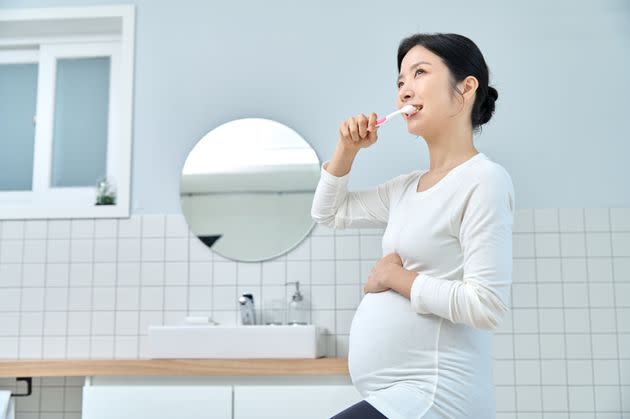So, THAT’s Why Your Gums Bleed During Pregnancy

Pregnancy comes with a whole lot of changes to your body, some that are fairly common and others that are quite rare.
When you’re pregnant you’re entitled to free dental care under the NHS, and it’s fairly common for pregnant people often experience bleeding gums — but they may not know the science and reasons why.
It turns out that bleeding gums in pregnancy is actually caused by a mild form of gingivitis – commonly referred to as ‘pregnancy gingivitis’.
What exactly is ‘pregnancy gingivitis’?
Dr Sam Jethwa of Bespoke Smile explains why this is the case saying: “The health of our gums is often overlooked, but is incredibly important for our overall health as well as our oral health.
“Gingivitis is the term used for gum disease when it is in its early stages, and is very common to see in pregnant women. Symptoms of gingivitis include bleeding gums (more likely to bleed when brushing or flossing), and swollen gums that may also be sore.
“If not treated, gingivitis can eventually lead to periodontitis (gum disease), which can cause teeth to become loose and fall out.”
The most common cause of gingivitis in people who aren’t pregnant is poor oral hygiene, which will cause a buildup of bacteria and plaque on the gums. Plaque is the sticky film which covers the teeth. Plaque forming is normal, but if it is not removed then it can cause oral health issues.
However, pregnant women are more prone to a buildup of plaque due to hormonal changes, including high progesterone levels.
How can I maintain healthy gums during my pregnancy?
In order to maintain healthy teeth and gums it’s vital to brush your teeth twice a day with a fluoride toothpaste, says Dr Jethwa.
“Your toothbrush should clean one tooth at a time, but this can vary depending on the size of your teeth or toothbrush. Focus on one tooth for around three to five seconds.
“Once you have brushed the outside surface of the tooth, repeat from the inside of the mouth. So many people do not realise how important it is to brush their teeth from the inside of the mouth, not just the outside. Gently direct your brush along the gum line, tongue and roof of the mouth. You should brush your teeth for around two minutes.”
He also highlights the importance of flossing and says flossing is incredibly important for oral hygiene as our toothbrush alone cannot fit into all the gaps where food may be left.
Flossing daily helps to remove plaque from below the gumline which can damage tooth enamel and also cause gums to become sore and bleed.
“In the long term flossing regularly can help to prevent gingivitis, or gum disease. If you are struggling with bleeding gums, try opting for a soft bristled toothbrush and use a mouthwash that avoids alcohol (not straight after brushing though, you do not want to wash away the fluoride as this protects the teeth’s enamel).
“Try to avoid sugary drinks and snacks – if you are having sugar, look to keep this to meal times as this will reduce how long the mouth is exposed to the sugar for.”
The NHS also recommends that if you’re experiencing ‘morning sickness’ (which we know doesn’t exactly only happen in the morning) to always rinse your mouth with water after each time you are sick to prevent the acid in your vomit from damaging your teeth.
However, they also advise to wait one hour before properly brushing your teeth as they’ll be “softened by the acid from your stomach”. Who knew?!
If you’re suffering from bleeding gums during pregnancy, make sure to speak with your dentist for further advice.

 Yahoo News
Yahoo News 